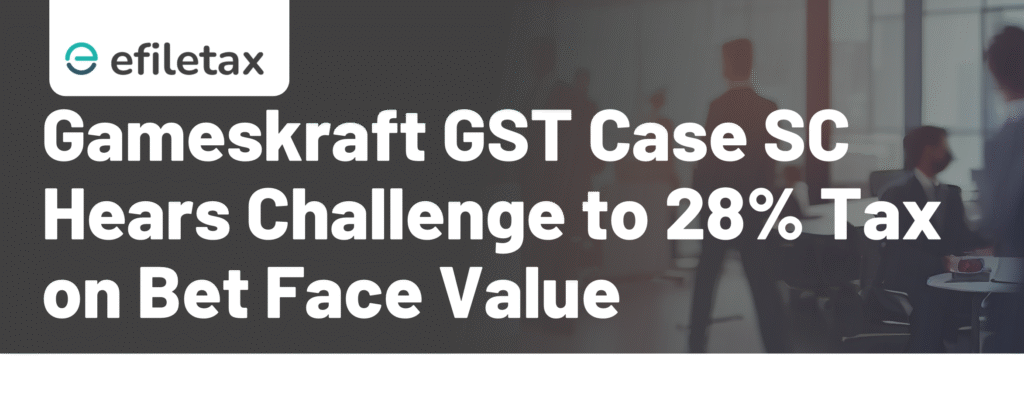
Gameskraft GST Case: 28% Tax on Face Value Under Supreme Court Scrutiny
The Gameskraft GST case is once again under the Supreme Court’s spotlight. On 23 July 2025, lawyers representing online gaming and casino platforms strongly challenged the levy of 28% GST on the face value of bets, calling it arbitrary, unworkable, and contrary to the Constitution.
This legal battle, arising from retrospective tax demands totalling ₹21,000 crore, could redefine the future of online gaming taxation in India.
What Is the Gameskraft GST Dispute About?
At the core of the case is a ₹21,000 crore GST demand raised by DGGI against Gameskraft Technologies Pvt Ltd, arguing that online games offered by the platform are in the nature of betting and gambling, and thus taxable at 28% under Rule 31A of the CGST Rules, 2017.
However, Gameskraft and several other platforms argue their games are skill-based, not chance-based, and hence should not attract this rate.
What Happened in the Supreme Court Hearing?
- Date: 23 July 2025
- Bench: CJI DY Chandrachud-led Constitution Bench
- Argument by Casinos/Online Platforms:
- The 28% GST on face value (instead of net revenue or platform fee) is not just unviable, but confiscatory.
- Rule 31A(3), which allows taxing entire bet amount, is allegedly ultra vires the CGST Act.
- Lawyers relied on judgments that distinguish between games of skill and games of chance.
Key Legal Issue: Validity of Rule 31A of CGST Rules
Under Rule 31A(3) of CGST Rules, entire bet value is taxed at 28% for actionable claims like betting, casinos, and lotteries.
But the CGST Act, 2017 itself does not define taxation on the face value of bets, nor does it clearly distinguish between skill vs chance for online games.
Expert Tip: Rules cannot override the parent Act. If Rule 31A lacks legislative backing, it may be struck down.
Timeline Snapshot
| Event | Date |
|---|---|
| Show cause notice to Gameskraft | 2022 |
| Karnataka HC quashes demand | May 2023 |
| SC stays HC order | September 2023 |
| GST Council imposes 28% on bets | August 2023 |
| Retrospective demand resurfaces | Late 2023 |
| Constitution bench begins hearing | July 2025 |
What Makes the 28% Tax Rate Controversial?
- Not on income, but on total stake value
- Retrospective effect from 2017
- Affects not just online games, but also casinos and horse racing
- Could bankrupt compliant operators if upheld
Government’s Stand
The Centre argues the activity is gambling, and Rule 31A is valid. It insists all “games involving stakes” must be taxed at the higher slab, regardless of skill.
CBIC’s View: Online gaming platforms were always liable at 28% — the July 2023 decision was just a clarification, not a new levy.
Constitutional Questions Raised
- Does Rule 31A exceed the scope of the CGST Act?
- Can such tax be levied on games of skill?
- Is the retrospective levy legally and economically justifiable?
- Should actionable claims (like stakes) be taxed as “supply”?
FAQs
Q1. What is Rule 31A of CGST Rules?
It deals with the valuation of supplies involving betting, lotteries, and actionable claims. It allows GST to be levied on the face value of bets/stakes.
Q2. Has the court decided the case?
No. The matter is ongoing before a Constitution Bench.
Q3. Will the outcome impact only Gameskraft?
No. It will affect all online gaming, casinos, and horse racing platforms, both retrospectively and going forward.
Final Word
The Gameskraft GST case is a landmark one, with constitutional implications for online gaming, taxation of digital services, and powers of delegated legislation. If Rule 31A is struck down, it will force the government to amend the law itself, not just tweak the rules.
This is one of India’s biggest tax vs tech legal battles.
Need help navigating GST disputes or compliance?
👉 Talk to Efiletax experts now and protect your business.
Summary
The Gameskraft GST case challenges the 28% tax on face value of bets. SC is hearing if Rule 31A of CGST Rules is ultra vires. The outcome could reshape taxation for online gaming, casinos, and retrospective GST demands.